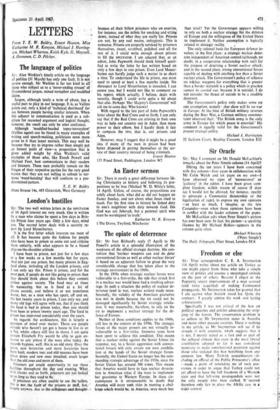The language of politics
LETTERS
From T. E. W. Baldry, Ernest Heaton, Miss Katharine M. R. Kenyon, Michael I. Harring- ton, Michael Wharton, Keith Kyle, G. Meynell, A. Oommen, C. D. Filcher.
Sir: Alan Watkins's timely article on the language of politics (31 March) has only one fault. It is not severe enough. Mr Watkins is far too kind to all those who subject us to a 'never-ending stream' of ill-considered jargon, mixed metaphor and muddled idiom.
Jargon, although lately a term of abuse, has a useful part to play in our language. It is, as Vallins points out, only a kind of 'technical shorthand' for use between people having similar interests. When this adjunct to communication is used as a sub- stitute for reasoned argument and logical thought, however, the result can only be utter confusion.
Although 'muddled-headed topsy-turveydom' (Vallins again) can be found in many examples of writing and speech-making, politicians seem more prone to it than lesser mortals. This may well be because they try to impress rather than simply put an honest point of view—a proposition that is given added weight by Alan Watkins's valid examples of those who, like Enoch Powell and Michael Foot, best communicate to their readers and listeners. These men probably remain on the fringes of their respective parties for the very good reason that they are not willing to submit to tor- tuous 'word-bending' that will conform to a pre- determined pattern.
T. E. W. Baldry Alsen Strasse 14a, 483 Gutersloh, West Germany






































 Previous page
Previous page